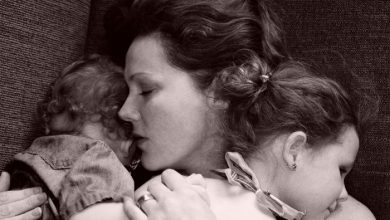
Yes, parenting is challenging—but are you making it worse?
It’s so easy to do that you don’t even realize you’re doing it: saying words that actually set you up for failure and frustration.
In this episode, Carol and Anne share the phrases that make parenting a bigger challenge than it already is. If you want parenting to be simpler and more fulfilling, listen to this episode. It’s just that easy.
This week’s Parenting Practice
This week, notice your language. Are you speaking in a way that makes your child the problem? Set these intentions: “I’m aware of what I’m saying. I’m catching myself when I set myself up to make my parenting experience harder than it needs to be. I am changing my language to be honest with myself without adding drama or creating more struggle.”
Transcript of podcast episode
Carol: Your child doesn’t wake up in the morning with the conscious thought, “I’m going to see how miserable I can make my parents’ day today.”
Welcome to The Child Whisperer Podcast. I’m your host, Carol Tuttle, author of the bestselling parenting book, The Child Whisperer. I’m with my co-host, Anne Tuttle Brown.
I’ve noticed that a lot of parents make parenting harder than it needs to be, and the catalyst and what’s behind that is the language and vocabulary they use when it comes to their parenting experience. On The Child Whisperer Facebook group, we have a mix of parents that have various points of reference to their experience in life and you can tell those that have been long term students of my work. This is something I’ve been teaching now for well over two decades is how important words are.
And what we experience in life, words create. Words put attention and are focused on what will create more of the same. So as we put attention on what we don’t want, we empower that. We make it harder for things to get better. It creates interference. Let’s just say it’s keeping us stuck in a place we don’t wanna be.
And so, we went through the Facebook group and we actually cataloged a few phrases. One of the most commonly shared phrases, and I’m not dismissing the fact that you are having a tough time or there’s something up for you, and you’re frustrated, and there’s emotion around it. That’s all fine. You’re gonna have that as a parent. You’re gonna have times that can feel exhausting and where you’re not sure of the answer. And then you feel lost and you feel uncertain and you’re looking for feedback and help.
Yeah, you don’t need to set yourself up for it being harder than it needs to be. The most used phrase that creates a stuck experience in parenting is by introducing whatever the issue is by saying, “I’m struggling with…” Now, that may speak to the fact, “Well, I am struggling with it.” Well, that’s okay. You don’t need to announce that. Of course, you are. You wouldn’t be asking the question. You could even just post the scenario and say, “I’m having this experience with my child and I’m looking for support in finding resolution. What’s worked for you?”
Notice that I’m still presenting, “Here’s what’s going on.” I don’t need to put the adjective on it, the tough thing.
Anne: So you’ve shared this before in the beginning of 2018. You dropped the word “struggling.”
Carol: Well, I had given it up years ago, but I invited everyone on my Facebook Live show.
Anne: And so, some people came up with different words like, “I have a challenge,” or, “I am learning,” or, “What’s with the word ‘struggle?'” That’s kind of a trigger word for use…like, drop the “struggle.” What’s with the word “struggle” that makes it such a negative place to be?
Carol: Because we live in a habit as a humanity that life has to be a struggle. It’s a conditioning that we have to agree and be okay with a certain amount of angst and struggle, and pain, and illness, and disease, and all the things that actually struggle represents. And I no longer believe that you have to struggle with anything. It may challenge you. It may some days get the best of you. It may cause you to dig deep. But struggle set you up to feel powerless. You’re a victim of life. Good luck. You know, it’s survival.
It doesn’t set us in a position of succeeding in it. It puts us in a place of victim which victims are powerless. It does not infuse well-being. You know, when you say it, “I’m struggling with…” does it take the energy away from you? Does it deflate your energy? Does it depress you, discourage you? What’s it create just in expressing the word? Versus, “I’m overcoming this challenge. I’m finding answers.”
Anne: “I’m still growing in this specific area.”
Carol: Yeah. This child is really teaching me a lot and it can be really challenging at times. There’s an optimism in that, a hope, a potential. And when it comes to children, we’re giving them a tremendous amount of power. There, we’re the victim of our children then. There, where’s the place of power with that, with the child, you know? And suddenly you start to perceive your child, that you’re a victim of your child’s behavior.
And I’ve always said, your child doesn’t wake up in the morning with the conscious thought, “I’m going to see how miserable I can make my parents’ day today.” There’s something that’s not working. There something out of balance. It’s your opportunity to discover that and change it as the parent. When you say, “I’m struggling,” you are powerless and your child has all the power and they are doing this to you. It’s happening to you.
And in a Child-Whispering parenting approach, you look at what you’re choosing as a parent that’s affecting the experience of the child. So read some of the phrases though that we’ve read. Some of them are very surprising to me that I’m like, “Wow. You’re really making yourself the victim of your child here.”
Anne: “I am at a loss. This child is ruining my life. They’re driving me crazy.” Struggle, obviously, is the ones we’ve talked about. “I don’t know what to do. I can’t take it anymore.” Strong adjectives like “vicious” or “hate” or—
Carol: “This child hates their brother.” Yeah. Really strong language. And, well, yeah, you may be venting. I would vent in your own personal writing out how you feel with the situation. Vent in private and then reach out in public space like that, asking for support and feedback. It’s very different. Maybe you need to vent your emotion. Maybe you need to vent your feelings. But if you’re looking for peer support based on, “You poor thing, I’m so sorry for you. I know what it’s like.” You know, there’s a certain degree you need that.
Anne: I mean, that’s supportive, right? To some degree.
Carol: Well, it is…
Anne: But maybe in closer circles.
Carol: Yeah. Maybe you need your good friend that can offer you that. I just know when you put it into a space in social media, you now have declared that in a more global way. You’re putting out information about your child as well and it doesn’t…
Anne: You’re amplifying the situation.
Carol: It makes you look weak and—get it together. Everybody has days as a parent. It’s okay.
Anne: Well, obviously, there are people who really are at a challenge with what to do and they’ve come to The Child Whisperer seeking answers.
Carol: That’s right, so then ask for that.
Anne: And so, how can they flip this? How can they flip this to be more positive state and create the results that they want by just changing the language?
Carol: Acknowledge how you feel, that’s fine. “I’m feeling this.” Own it. Do it in a way though that it doesn’t make your child the bad guy. That’s the variable here. A lot of how parents talk about a situation with their children, their children are really deemed the problem and they’re even conspiring to be this way, that this child, granted this child has presented challenges that you have not found answers for yet and you’re in it, that’s fair. And it’s fair to say you’re frustrated. “I get discouraged.”
Anne: You’re tired.
Carol: “I get tired.” That’s very different than, “This child is making me feel this way.” It’s, “I’m going to acknowledge how I feel.” You can even post that and say, “I feel frustrated. I feel discouraged at times. I’m here seeking support. Thank you for offering it. I really love this child and haven’t gotten the ‘a-has’ yet I need. What can you share with me?” See the difference in that, without all the, “I’m struggling. This child is ruining my life?” That’s just drama.
That’s creating more drama than is necessary which puts you in a very powerless position. And, where else are you doing this in your day-to-day life? What degree of struggle are you so conditioned to that now this child, you know, maybe you were struggling with something else that got relieved, now this is the new place?
Anne: On healwithcarol.com, you have a “Stuck Quiz” people can take and they identify in which areas they’re stuck.
Carol: Stuck creating struggle. Yeah. Where in your life are you creating struggle? That is a good place to send people because when struggle is your habit and you think you have to survive struggle, once one place the struggle is lifted, it will show up somewhere else because you need a certain dosage of struggle. So the goal is to be…
Anne: It’s very eye-opening to be aware of that.
Carol: Yeah. You know, what would my life look like if I did not have that point of reference that I could actually, even faced with the challenge, be aware that I’m confident I’ll find a solution?
Anne: And you talked about this in your book, Remembering Wholeness and Mastering Affluence.
Carol: And Mastering Affluence. Yeah. I came from that. You have to understand that it’s not like I grew up with this insight. I had to learn it. I had to teach myself.
Anne: Were you stuck in a place of talking about this with…
Carol: Oh, yeah. It’s been a while.
Anne: I mean, there wasn’t social media back then, but were your thoughts consumed with all these kids?
Carol: No. Oh, very much. I talked about it.
Anne: As you’re struggling or ruining my life or…
Carol: Not so much of that. I saw myself as the problem more than my children. So I knew the issue was me more than my kids and I needed to switch that. And I remember being in our kitchen when you were in grade school and that’s when we had all those affirmations taped all over the house. I had read Louise Hays’ book. This was in the ’90s. “You Can Heal Your Life.”
And I realized my language was just terrible. I was just creating pain and struggle and victim experiences. And I had to retrain my thinking mind and create a new vocabulary. And to catch myself, we literally on construction paper wrote affirmations from her book. There must have been about 30 all over the house. And you would all take them down when friends were coming. I was like, “Let them learn this. This is a good thing.”
You know, we were like the weirdo family, but it was to remind me. I put it in my face so I would change my language, change my thought process.
Anne: Actually, I did that after I had Katie. I’ve realized after having three kids, my mind goes into this more pessimistic state. And so, after Katie, after she was born, I was very negative towards myself. And so, I would put up little stickies all over the house, “I’m a great mom. I’m doing the best I can. I’m the perfect mom for Katie.” It happened again with my second child. It was kind of redirected to something different each time and it lasts for about a month. But it was a tool that you had taught me is, you know, it’s a muscle. You need to keep training it.
Carol: Yeah. How would it look if everybody in your family got along, you know, your parent-child relationship with every child was successful and easy? Can you even imagine that? Can you imagine this child in a different state of being? What would that child look like if they were cooperative or behaving in a way that you felt was true to their nature and honorable to them? You could say, “That child is so easy for me.” What would that look like to even know that you’re so focused on the problem, you don’t give that any consideration?
You can’t even imagine what it would look like if it were resolved. And you have to start opening the space for that to even materialize by taking time to even, “What would I be saying if this… I know what I’m saying with the issue. I hear myself.” You know, listen to how you’re talking about it and how many people you’re sharing it with, and how many times does your child standing there hearing you talk about them as the problem. What does that create more of, more of what you don’t want? So you’ve got to spend time on, at least equal time, on what do you want?
I remember standing in the kitchen and realizing that I was so used to my life being hard and being a struggle that I wouldn’t know what to do without it. There’s something I always had to heal or fix. And I started rehearsing the thought, “I’m experiencing joy and joy is my normal state.” Because what had been my normal state was, “I’m experiencing struggle. Struggle is my normal…” And I have to remind myself and go, “Oh, that’s right. I don’t need to create that drama. You know, I’m no longer creating all that.” And it took years to really get there.
Anne: Oh, you need to keep doing it, too.
Carol: Yeah. I knew though over time.
Anne: It’s like if you stop excising. But, yeah, it becomes easier and then…
Carol: But I realized I was just sort of addicted to the struggle. I was so heavily conditioned to it.
Anne: I’ve definitely been guilty of this as a parent of three young kids, you know. The cultural story is, it’s hard, it’s exhausting, it’s tiring. And my husband and I will just, you know, talk about it with each other and we’ll complain to a family. And it’s like, “Man, I wouldn’t want to hear this.” And so we even had this conversation last week, we’re like, “We need to stop complaining about this.” Like, “Enough already.” Like, “Let’s enjoy this phase.”
And we do. There are so many parts that we enjoy. But with three young kids, it’s more physical attention is required. But let’s talk about what we want and let’s focus on that.
Carol: If you need a dumping space, get a journal and say, “All right. I need to vent. I need to dump. I need to get this out.” Write it out. Close the book on it. “All right. I did it.” Close the book and say, “Okay. I did it. I’m gonna leave that here.”
Anne: Rip up the paper.
Carol: “I’m gonna leave that there. Now, what do I want?” Because, you know, there is a need to express the emotion.
Anne: I think you could even have that verbal session with your spouse and say, “Okay. Let’s have a venting, but let’s end this by saying what we want. And let’s be proactive in that.” And even if you’re gonna write down a couple intentions or affirmations and post them so you can be accountable to each other, but switch that. Don’t just, you know, nonchalantly throw it out there which I was finding myself doing because it is a lot of work to be a parent. But it’s a joyful, beautiful work that you can experience…
Carol: It’s going on for a lot of years so I’m sure you’ll make it. Some things are just, “Welcome to parenthood.” You go through phases. You go through cycles where maybe that child is just presenting more moodiness or being more of a challenge, and it’s gonna shift. It’s just like, it’s okay.
Anne: There’s an affirmation that I have hanging in my closet that I love referring to and it is, “Answers, solutions, and insights to my life experiences are effortlessly and easily awakened.”
Carol: That’s a good one.
Anne: Yeah. Just say that, you know, as you move through life, you’ll be given the intuition, the guidance to handle these challenges and to move through life more joyfully.
Carol: The practice this week is to notice your language, set an intention that, “I’m aware of what I’m saying and I’m really catching myself, setting myself up to make my parenting experience harder than it needs to be. So how can I change my language where I’m still honest with myself that I’m able to express that it’s challenging right now without adding the drama to create more struggle and keeping it from projecting onto your child that they are the problem.” There is a problem to resolve.
Don’t make your child the problem. Make them a part of the experience that they can also become the beneficiary of your insight so things change for the better. Watch the hashtags you use.
Anne: There’s a popular hashtag, “Kids are the worst.”
Carol: Who says that?
Anne: I don’t know. There’s a lot.
Carol: I don’t understand that.
Anne: The funny little things kids do. #kidsaretheworst.
Carol: Really? Like this is super popular?
Anne: Yeah.
Carol: I roll my eyes. I’m like, “Oh, my goodness.” Do you understand what you’re putting out there? I just see the energy forming into motion and the children in their lives just showing up, making them write. Like, “Oh.”
Anne: Yeah. Well, we have another podcast where we talked about how to talk about your kids on social media so that would go along with that. But the whole point of this is as you open the space and come from a space of positivity and intention, the solutions and the answers will more easily come to you and you can move through that growth.
Carol: I agree.
Thanks for listening. For more support, go to thechildwhisperer.com where you can purchase the book, subscribe to our weekly parenting practice e-mail, and find the transcription and audio of “The Child Whisperer” podcast.
Anne: If you’re listening on iTunes, thank you for leaving a review. If you have a parenting question, please send it to [email protected].



